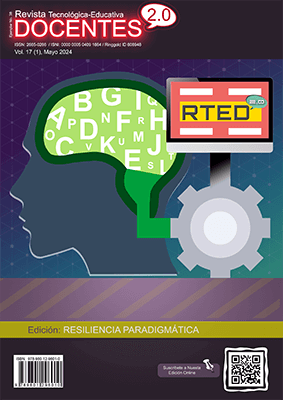Comparative Analysis in the Teaching of Educational Trends Mediated by ICT in Higher Education
 DOI:
https://doi.org/10.37843/rted.v17i1.490
DOI:
https://doi.org/10.37843/rted.v17i1.490
Main Article Content
Abstract
Education is fundamental to achieving a better quality of life and improving social welfare, from which communities' cultural, social, and economic growth is generated. The objective of this research was to make a comparative analysis of the educational trends in the use of ICT carried out by the educational program students. It was based on the comparative method under the pragmatic paradigm with a mixed approach: the quantitative analysis of the statistical results of the educational intervention and the qualitative analysis to know the degree of satisfaction through a survey applied to the students. The students who participated were 34; 22 were assigned to CUCEA and 12 to CUNorte. The methodology used was comparative education, which allowed for the analysis of where the times, contents, activities, teaching strategies, and use of technological tools were determined. The results are presented in two aspects: the first, carried out by the two work groups, reflecting the similarities with high achievement reflected in the percentage of attendance, general participation, and the grades obtained; the second, in the high degree of satisfaction they expressed. With everything done, it was possible to conclude with the appreciation of a very encouraging experience, that is, being able to promote or motivate future teachers in diversifying educational practices supported by current educational trends and, consequently, a great impact on society.
Downloads
Metrics
Article Details

This work is licensed under a Creative Commons Attribution-NonCommercial-NoDerivatives 4.0 International License.
Those authors who have publications in our journal accept the following terms:
- When a work is accepted for publication, the author retains rights of reproduction, distribution of his/her article for exploitation in all countries of the world in the format provided by our magazine and any other magnetic medium, optical, and digital.
- Authors will retain their copyright and guarantee the journal the right first to publish their work, which will be simultaneously subject to the Creative Commons Acknowledgment License (Attribution-NonCommercial-NoDerivatives 4.0 International (CC BY-NC-ND 4.0)). That allows third parties to copy and redistribute the material in any medium or format, under the following conditions: Acknowledgment - You must properly acknowledge authorship, provide a link to the license, and indicate if any changes have been made. You may do so in any reasonable way, but not in a way that suggests you have the licensor's endorsement or receive it for your use. NonCommercial - You may not use the material for a commercial purpose. NoDerivatives - If you remix, transform, or build from the material, you cannot broadcast the modified material. There are no additional restrictions - You cannot apply legal terms or technological measures that legally restrict you from doing what the license allows.
- Authors may adopt other non-exclusive license agreements to distribute the published version of the work (e.g., deposit it in an institutional archive or publish it in a monographic volume) provided that the initial publication in this journal is indicated.
- Authors are allowed and recommended to disseminate their work through the Internet (e.g., in institutional telematic archives, repositories, libraries, or their website), producing exciting exchanges and increasing the published work's citations.
- Request of withdrawal an article has to be done in writing by the author to the Editor, becoming effective after a written response from the Editor. For this purpose, the author or authors will send correspondence via e-mail: [email protected].
- The author will not receive financial compensation for the publication of his work.
- All Docentes 2.0 Journal publications are under the Open Journal System (OJS) platform at: https://ojs.docentes20.com/.
References
Area Moreira, M. (2019). La enseñanza universitaria digital: fundamentos pedagógicos y tendencias actuales. https://n9.cl/wcq3kf
Baño Egea, J. J., & Bosom Nieto, A. (2019). 2.1 PLE o PLE. https://n9.cl/d55hz
Carbajal, J. L., Suárez, F., & Quiñonez, X. (2018). Las TIC en la educación universitaria. Revista Multidisciplinaria Universidad, Ciencia y Tecnología, 22(89), 31-35. https://n9.cl/d5lkx
Consejo General Universitario. (2021). Dictamen de creación.
De León Gallo, M. T. (2016). La evaluación de programas educativos como estrategia para la mejora continua. DOCERE, (14), 19–22. https://doi.org/10.33064/2016docere141962 DOI: https://doi.org/10.33064/2016docere141962
Eduteka. (2021-2023). Uso educativo de los blogs. https://n9.cl/poaoy
Gomes Díaz de León, C., & De León de la Garza, E. A. (2016). Repositorio Académico Digital. Universidad Autónoma de Nuevo León. https://n9.cl/o40n0
Goss-Sampson, Mark, A. (2018). Análisis estadístico con JASP: una guía para estudiantes. https://n9.cl/p2jnb
Hernández Ramos, C. (2019). Los diseños instruccionales y sus alcances. Las necesidades de un buen diseñador. Revista de Educación, Cooperación y Bienestar Social, 7(16), 21-30. https://n9.cl/p9qvm
Kandel, I. L. (1967). La metodología de la educación comparada. https://n9.cl/mfprk
Krichesky, G. J. & Murillo, F. J. (2018). La colaboración docente como factor de aprendizaje y promotor de mejora. Un estudio de casos. Educación XX1, 21 (1), 135-155. DOI: https://doi.org/10.5944/educxx1.20181
MTA. (2023). Objetivo del programa. https://n9.cl/jjiql
Núñez Delgado, R. (2020). Paradigma Pragmático: Artículo de Revisión. https://n9.cl/ctk1o8
Núñez Moscoso, J. (2017). Los métodos mixtos en la investigación en educación: hacia un uso reflexivo. Cuadernos de Pesquisa, 47(164), 632-649. https://doi.org/10.1590/198053143763 DOI: https://doi.org/10.1590/198053143763
Raventós, F. (1990). Metodología comparativa y pedagogía comparada. Boixareu Universitaria.
Reyes, L., Céspedes, G., & Molina, J. (2017). Tipos de aprendizaje y tendencia según modelo VAK. TIA (Tecnología, Investigación y Academia), 5(2), 237-242. https://n9.cl/2wneb
Ruiz Medina, M. I., Borboa Quintero, M. S., & Rodríguez Valdez, J. C. (2013). El enfoque mixto de investigación en los estudios fiscales. Revista Académica de Investigación TLATEMOANI, 13, 1-25. https://n9.cl/fzjcm
Salazar Estrada, M. (2020). Escenarios de conversación y aprendizaje: Las interacciones comunicativas en las asignaturas bimodales. Cultura Educación y Sociedad, 11(1), 219–234. https://doi.org/10.17981/cultedusoc.11.1.2020.16 DOI: https://doi.org/10.17981/cultedusoc.11.1.2020.16
Web del Maestro CMF. (2015-2023). ¿Qué es el aprendizaje significativo? Definición, características y ejemplos. https://n9.cl/gxzt






